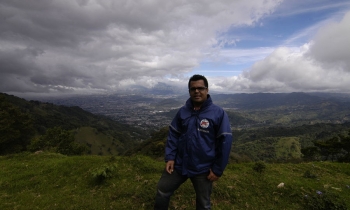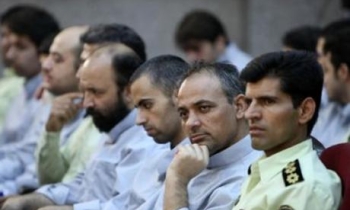The much-awaited hearings on the July 2004 murder of Forbes Russia Editor Paul Klebnikov have been put off until mid-March after two key suspects failed to appear in court Thursday, news agency RIA Novosti has reported.

Chechens Musa Vakhayev and Kazbek Dukuzov are to be retried in the Klebnikov case in keeping with a November 2006 Supreme Court ruling that overturned their acquittal in the initial trial. Both men were released from detention in May last year after a Moscow court declared them not guilty of murdering the Forbes editor.
The previous four-month-long trial was held behind closed doors, and all participants, including the 12 jurors, were silenced by a gag order. Court officials justified the secrecy on the grounds of classified evidence, and the safety of participants.
"The [Moscow City] Court notified them [Vakhayev and Dukuzov] of the date of the [new] hearings, and they acknowledged the summons," spokeswoman Anna Usacheva said, according to Novosti.
A third suspect, Fail Sadretdinov, was also cleared of murder charges last May but sentenced in January to nine years in prison on charges of property fraud in a separate case relating to his work as a public notary. He was brought to the courtroom for Thursday's hearing by a police convoy.
The defendants are to be tried by a 12-member jury, which the Moscow City Court has selected from among 50 candidates.
A US journalist of Russian descent, Klebnikov worked for Forbes since 1989 and became the first editor of Forbes Russia when it was launched in April 2004. He earned himself an international reputation for investigating murky business dealings and corruption in the post-Soviet era. He was shot dead on a Moscow street July 9, 2004.
Klebnikov's 2004 murder stoked international concern about freedom of speech in Russia, an issue pushed back into the spotlight by the killing last year of crusading Russian journalist Anna Politkovskaya.
Authorities failed to guarantee the safety or impartiality of jurors after the earlier trial, sources close to the trial told the Committee to Protect Journalists (CPJ). Jurors were not sequestered and could be readily approached entering or exiting the courtroom. The then-presiding judge, Vladimir Usov, and other court officials, did not stop the defendants or some defense representatives from making threatening statements in court that could have affected the jury, a CPJ source said. Those and other allegations of procedural violations raised doubts about the validity and fairness of the trial.
"We call on Russian court officials to hold an open trial," CPJ Executive Director Joel Simon said. "The first trial was riddled with procedural violations that were hidden from the public with closed-door proceedings and a gag order on all participants. We call on Russian court officials to open the hearing to the public to ensure a fair trial.â€
For four months following the May 5 verdict, court officials effectively blocked the Klebnikov family’s appeal to the Supreme Court by failing to provide them and their representatives with a transcript of the trial proceedings, which they needed to prepare a detailed appeal. Since the trial proceedings were sealed, and audio and video recording in the courtroom was prohibited, the transcript was the only document detailing the hearing. Russia’s Law of Criminal Procedure requires that access to the transcript be given to the plaintiffs within three days. The Klebnikovs filed their request for access in May and received the transcript in September.
Six months after the verdict, on November 9, 2006, Russia’s Supreme Court overturned the acquittal of Dukuzov and Vakhayev and ordered a retrial. Even then, court officials stalled the process by waiting over two months to set a start date for the new trial, and by failing to take the two suspects in the pre-trial custody, CPJ sources said.
He is one of 13 journalists murdered in contract-style killings since Russian President Vladimir Putin took office in 2000. In none of the cases have the masterminds been brought to justice and the record of impunity causes journalists to self-censor, CPJ found. Russia is the third deadliest country in the world for journalists.









